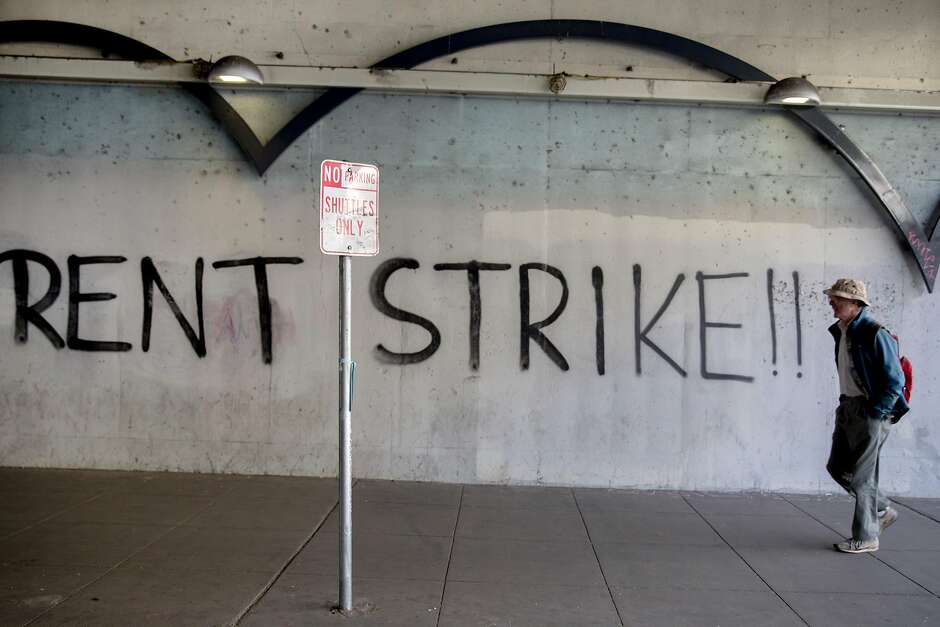Biz & Tech // Business
Coronavirus eviction ban: What Bay Area renters and landlords need to know

J.K. Dineen April 9, 2020 Updated: April 9, 2020 9:54 a.m. 
Evictions have been largely halted in California during the coronavirus health emergency. Photo: Jessica Christian / The Chronicle
With many Californians facing economic distress because of the coronavirus, state officials have taken steps to block evictions and protect renters. Here’s what Bay Area tenants and landlords need to know.
Answers for renters
Q: Can my landlord evict me while the health emergency is in place?
A: No. On April 6, state judicial leaders barred courts from enforcing eviction orders against renters. In ruling that eviction orders “threaten to remove people from the very homes they have been instructed to remain in,” the state Judicial Council went a step further than a March 27 executive order by Gov. Gavin Newsom, which required a statewide, two-month halt on evictions of tenants who could not afford to pay rent because of the coronavirus pandemic. The action halts legal procedures used by property owners to initiate and enforce evictions.
Q: What sort of evictions does the ruling cover?
A: The ruling applied to all evictions, regardless of cause.
Q: How long with the ruling be in effect?
A: The order will remain in effect until 90 days after Newsom declares an end to the current state of emergency. That’s likely at least through July.
Q: What if I was served an eviction notice before the Judicial Council order went into effect?
A: Tenants who were served with a eviction court summons prior to the new order cannot be penalized for failing to respond, unless they pose a public danger. For tenants who have already responded, trials are postponed for at least 60 days.
Q: What happens when the order is lifted? How soon will my rent be due?
A: It’s unclear. While these emergency rules effectively put evictions on hold at least through the summer, they do not “establish any new tenant rights or defenses to an eviction, address requirements for notifying landlords or providing documentation when tenants are unable to pay rent due to loss of income or other coronavirus-related reasons, or address how repayment will be handled,” according to the San Francisco Tenants Union. It is likely the state Legislature will address those issues when it returns in May.
Q: Can my landlord raise my rent during the health emergency?
A: It depends on the city. San Francisco Supervisor Aaron Peskin introduced legislation on April 7 that would freeze rent increases and pass-throughs. The San Francisco Apartment Association has already asked its members not to raise rents during the health emergency. Some cities have also enacted rent freezes. Concord has enacted a rent freeze for most people. Oakland has has capped rent increases at 3.5% in most cases and landlords can’t charge late fees.
Answers for landlords
Q: Do tenants have to provide evidence that they are unable to pay rent due to the coronavirus?
A: Yes, the tenant must provide the landlord evidence that they are unable to pay rent due to the financial impact of the coronavirus. This requirement may be satisfied with a letter, email, or other written communication that explains the financial impact that the tenant is experiencing. The explanation should be objectively verifiable. Third-party documentation is not necessary to satisfy this step, but tenants are advised to provide supporting documents. This could include evidence of a loss of income related to a business closure, loss of working hours or wages, layoffs, or out-of-pocket medical costs caused by the pandemic.
Q: What if I can’t pay my property taxes or mortgage?
A: See our detailed FAQ for homeowners and other property owners on SFChronicle.com.
Chronicle staff writer Bob Egelko contributed to this report.
J.K. Dineen is a San Francisco Chronicle staff writer. Email: jdineen@sfchronicle.com Twitter: @sfjkdineen
Follow J.K. on: https://www.facebook.com/SFChronicle/sfjkdineen
J.K. Dineen joined the San Francisco Chronicle in 2014, focusing on real estate development for the metro group, a beat that includes land use, housing, neighborhoods, the port, retail, and city parks. Prior to joining The Chronicle, he worked for the San Francisco Business Times, the San Francisco Examiner, the New York Daily News, and a bunch of newspapers in his native Massachusetts, including the Salem Evening News and the MetroWest Daily News.
He is the author of two books: Here Tomorrow, about historic preservation in California (Heyday, 2013); and the forthcoming High Spirits (Heyday 2015), a book of essays about legacy bars of San Francisco.
A graduate of Macalester College, Dineen was a member of Teach For America’s inaugural class and taught sixth grade in Brooklyn, N.Y.
©2020 Hearst